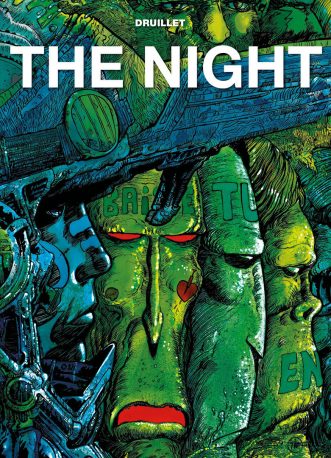 By PHILIPPE DRUILLET (Titan Comics; 2014/19)
By PHILIPPE DRUILLET (Titan Comics; 2014/19)
From France, a fearsome 1970s-era creation that’s outrageous, overwrought, disorienting and downright psychotic by turns. THE NIGHT (LA NUIT) is undoubtedly some kind of standout in the Euro-comics field (which remains shamefully underutilized in the US), and a key work in the oeuvre of its genius creator Philippe Druillet. What gives this short work its resonance is the fact that it has definite real life relevance, being to Druillet what THE CROW was to James O’Barr: a tortured expression of real-life grief in the form of a genre comic.
The grief here springs from the 1975 death of Druillet’s wife Nicole, photographs of whom, in THE NIGHT’S most audacious touch, are incorporated into the illustrations. Those illustration are incredibly dense and detailed, often filling entire pages and depicting untold legions of mayhem. First, though, we get an unabashedly bitter and unsettled textual introduction in which Druillet rages at the doctors who let his beloved die and a society that goes out of its way to deny the realities of death. As for Druillet himself, he claims he’s “learning to love” the void, a sentiment that’s fully evident throughout THE NIGHT.
Mayhem is the driving force behind this comic, which is set in some unidentified post-apocalyptic landscape of monstrous alien structures that’s lorded over by warring biker gangs. These gangs worship blood and desolation, take the Rolling Stones’ “Brown Sugar” as their anthem and speak in nihilistic slogans like “What is life to us, the living dead? Who am I? Who gives a shit?” The narrative, such as it is, involves the gangs in question forging a tentative truce in order to take on the fascistic (and seemingly extraterrestrial) overlords enslaving this world, knowing full well that they’ll all die in the attempt.
What follows is an astonishing cavalcade of destruction, with total annihilation the inevitable end for everyone involved. Conceptions like liberty and justice have no place in this bleak universe, where a headlong rush into oblivion is the most “heroic” act conceivable. The human interest is nil (the most compelling character being the deceased Nicole) and the semi-coherent narrative certainly doesn’t compel attention, but as a baroque mood piece THE NIGHT excels, imparting a real sense of psychic upset conveyed with all the force of a sharp kick to the gut.
